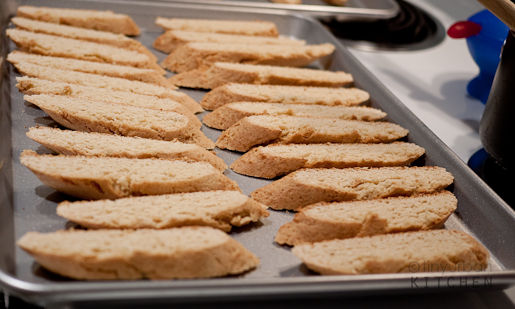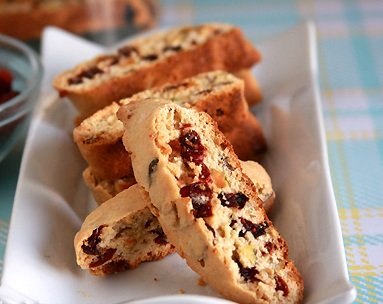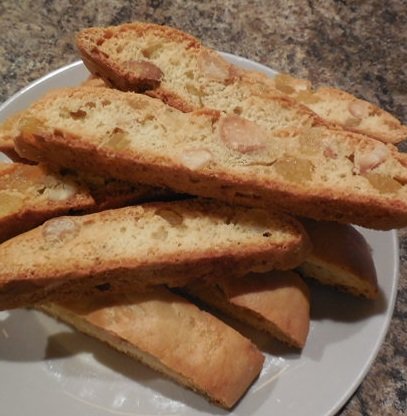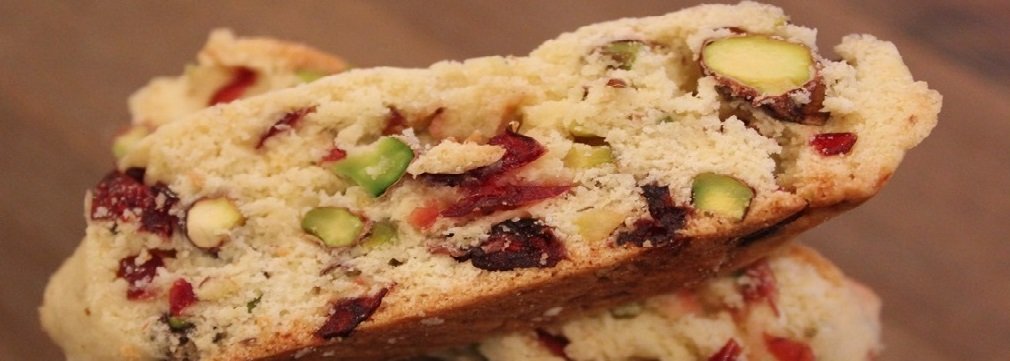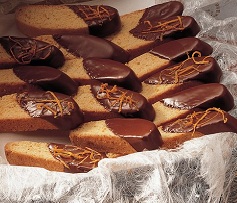What is Biscotti?
If you type "what is biscotti' into Google. One of the top results returned will be from Wikipedia and there it states:
From Wikipedia, the free encyclopedia
Biscotti ( /bɪˈskɒti/; Italian pronunciation: [bisˈkɔtti]), more correctly known as biscotti di Prato (English: Prato biscuits), also known as cantuccini (English: nooks), are twice-baked biscuits originating in the Italian city of Prato. The biscuits are oblong-shaped almond biscuits, made dry and crunchy through cutting the loaf of dough while still hot and fresh from baking in the oven.
"Biscotti" is the plural form of biscotto. The word originates from the medieval Latin word biscoctus, meaning "twice-cooked/baked." It defined oven baked goods that were baked twice, so they were very dry and could be stored for long periods of time. Pliny the Elder boasted that such goods would be edible for centuries. Such nonperishable food was particularly useful during journeys and wars, and twice baked breads were a staple food of the Roman Legions.
Ok.......thanks!That’s enough about biscotti in technical terms!What is biscotti, defined in baker’s language?
Well "What is biscotti?" is not a question easily answered.
|
In North America, biscotti refers to a specific type of Italian cookie or biscuit, which is derived from the Tuscan biscuit called, “cantucci”. Which is a hard almond flavored cookie that is baked twice, and in Italy still frequently served with the sweet Italian dessert wine, Vin Santo? |
In North America, biscotti refers to a specific type of Italian cookie or biscuit, which is derived from the Tuscan biscuit called, “cantucci”. Which is a hard almond flavored cookie that is baked twice, and in Italy still frequently served with the sweet Italian dessert wine, Vin Santo?
The word "biscotti" is the plural form of biscotto. In Italian, the word "biscotto" means "biscuit" or what we Americans have come to call a “cookie.” Although commonly used to indicate the biscuits of Prato, “biscotti di Prato”, in modern Italy, what we call Biscotti is also seems to be known by the name "cantuccini."
The word “biscotti” also has its origins from the Medieval Latin word biscoctus, meaning "twice-cooked or baked." So in Italy, biscotti also means twice baked, and therefore any cookie or biscuit that is twice baked can be referred to biscotti.
Well are you confused yet?
Well you are not alone!!!
The confusion of meaning, between biscotti and cantucci, might have been born from the fact that on an old sign, present for over 100 years, in front of a long established biscuit maker in Prato:
"Biscottificio Antonio Mattei",
states, just below the name of the company name
"Manufacturers of Cantuccini".
Cantuccni was, in its time, one of the major products of the biscuits (bakery). The sign remained unchanged for years and people of Italy became accustomed to associating the name "cantuccini" with the biscuits typical of the regions of Sardegna and Sicily.
Ok! Got it?
Well I was still not sure that I got it so….
|
….while at lunch with family and friends I asked an Italian friend "What is biscotti?"....."or more specifically explain to me the difference between biscotti, cantucci, and cantuccini". |
….while at lunch with family and friends I asked an Italian friend "What is biscotti?"....."or more specificaly explain to me the difference between biscotti, cantucci, and cantuccini".
He said...
..“Biscotti (twice-baked/cooked) is the generic term for any cookies that are twice-baked and loosely used for any type of cookies”.
So when we call the cookies here, "biscotti", since they are baked twice we are correct.
In the States, most of us think of biscotti as the hard cookies we like to dip into our coffee or hot chocolate and I was under the impression that cantuccini referred to the miniature version of biscotti that was baked only in the town of Prato.
“No, no, no! My Italian friend tells me, let there be no more confusion. Biscotti are any twice-baked cookies. Cantucci and cantuccini originated in the town of Prato, possibly made famous by Antonio Mattei, and they always have almonds”.
“The (diminutive) "-ini" means little. So cantucci are the larger cookies, and cantuccini are the smaller, fit-the-whole-cookie-in-your-mouth-at-once, bite-size cookies”.
“If your biscotti have raisins, figs, chocolate on top, or some other variation, you are not eating cantucci or cantuccini; rather, you are eating biscotti”.
Got it? No?
So when asked "What is biscotti? You can see that the meaning is not completely clear.
But they’re soooo! good, who cares anyway…?
Questions or Comments?
Like a recipe or something you read? LET US KNOW!
Have a Question don't be shy, ASK US!
What's New
-
Almond Anise Biscotti
Jan 12, 15 04:43 PM
Almond Anise Biscotti -
Peanut Butter Biscotti
Jan 12, 15 12:41 PM
If you like peanut butter cookies, you will love these Peanut Butter Biscotti. -
Butterscotch Biscotti
Jan 10, 15 07:24 PM
These decadent Butterscotch Biscotti are made with a bit a extract and lots of butterscotch chips.







